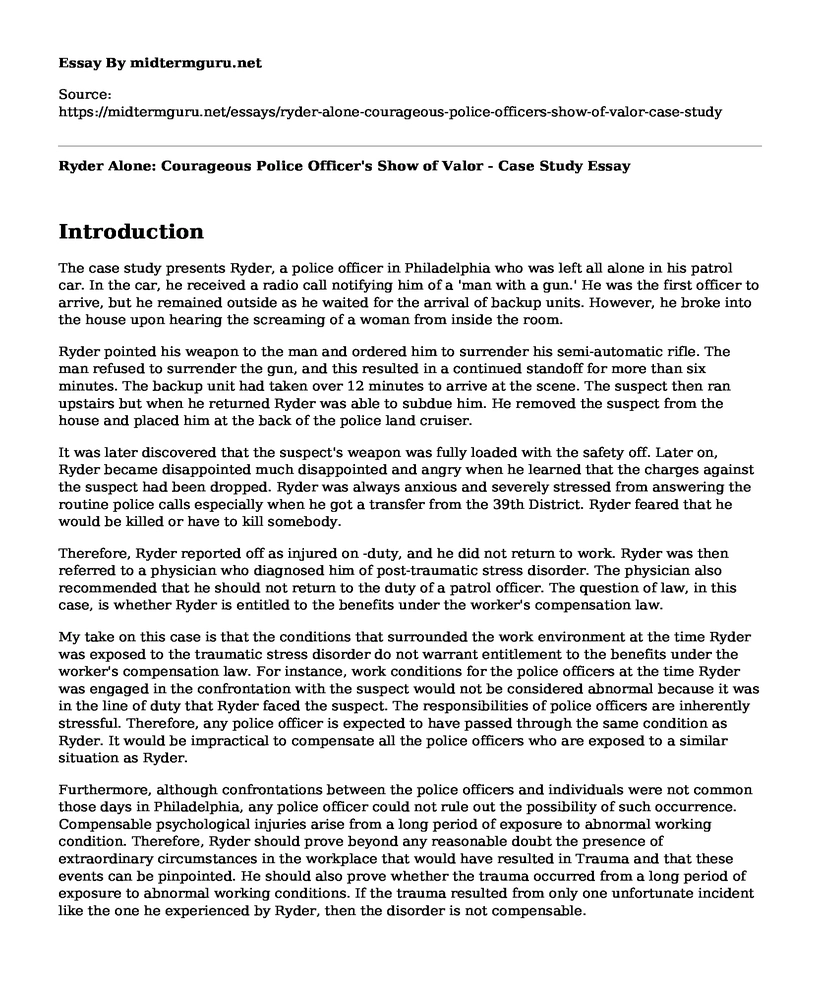Introduction
The case study presents Ryder, a police officer in Philadelphia who was left all alone in his patrol car. In the car, he received a radio call notifying him of a 'man with a gun.' He was the first officer to arrive, but he remained outside as he waited for the arrival of backup units. However, he broke into the house upon hearing the screaming of a woman from inside the room.
Ryder pointed his weapon to the man and ordered him to surrender his semi-automatic rifle. The man refused to surrender the gun, and this resulted in a continued standoff for more than six minutes. The backup unit had taken over 12 minutes to arrive at the scene. The suspect then ran upstairs but when he returned Ryder was able to subdue him. He removed the suspect from the house and placed him at the back of the police land cruiser.
It was later discovered that the suspect's weapon was fully loaded with the safety off. Later on, Ryder became disappointed much disappointed and angry when he learned that the charges against the suspect had been dropped. Ryder was always anxious and severely stressed from answering the routine police calls especially when he got a transfer from the 39th District. Ryder feared that he would be killed or have to kill somebody.
Therefore, Ryder reported off as injured on -duty, and he did not return to work. Ryder was then referred to a physician who diagnosed him of post-traumatic stress disorder. The physician also recommended that he should not return to the duty of a patrol officer. The question of law, in this case, is whether Ryder is entitled to the benefits under the worker's compensation law.
My take on this case is that the conditions that surrounded the work environment at the time Ryder was exposed to the traumatic stress disorder do not warrant entitlement to the benefits under the worker's compensation law. For instance, work conditions for the police officers at the time Ryder was engaged in the confrontation with the suspect would not be considered abnormal because it was in the line of duty that Ryder faced the suspect. The responsibilities of police officers are inherently stressful. Therefore, any police officer is expected to have passed through the same condition as Ryder. It would be impractical to compensate all the police officers who are exposed to a similar situation as Ryder.
Furthermore, although confrontations between the police officers and individuals were not common those days in Philadelphia, any police officer could not rule out the possibility of such occurrence. Compensable psychological injuries arise from a long period of exposure to abnormal working condition. Therefore, Ryder should prove beyond any reasonable doubt the presence of extraordinary circumstances in the workplace that would have resulted in Trauma and that these events can be pinpointed. He should also prove whether the trauma occurred from a long period of exposure to abnormal working conditions. If the trauma resulted from only one unfortunate incident like the one he experienced by Ryder, then the disorder is not compensable.
My decision conforms with the provisions of Regulation 32 of the compensation law that stipulates that any compensable disorder should be service-oriented and that individual seeking compensation should be able to prove that the disorders that accrue are abnormal and can be traced back to the work environment of the person in question.
Cite this page
Ryder Alone: Courageous Police Officer's Show of Valor - Case Study. (2023, Jan 23). Retrieved from https://midtermguru.com/essays/ryder-alone-courageous-police-officers-show-of-valor-case-study
If you are the original author of this essay and no longer wish to have it published on the midtermguru.com website, please click below to request its removal:
- Law Essay Example: My Approach to Juvenile Justice
- Paper Example on Criminal Justice: Witness Interference
- Research Paper on Right to Water
- Articles Analysis Essay on Bias and Racism in Police System
- 'Superpower' and 'Empire' - Essay Sample
- 16 Charged With Killing 19-Year Old Over Sexual Harassment - Essay Sample
- From Army Service to Supervising Prisoners: My Career in Corrections - Research Paper







